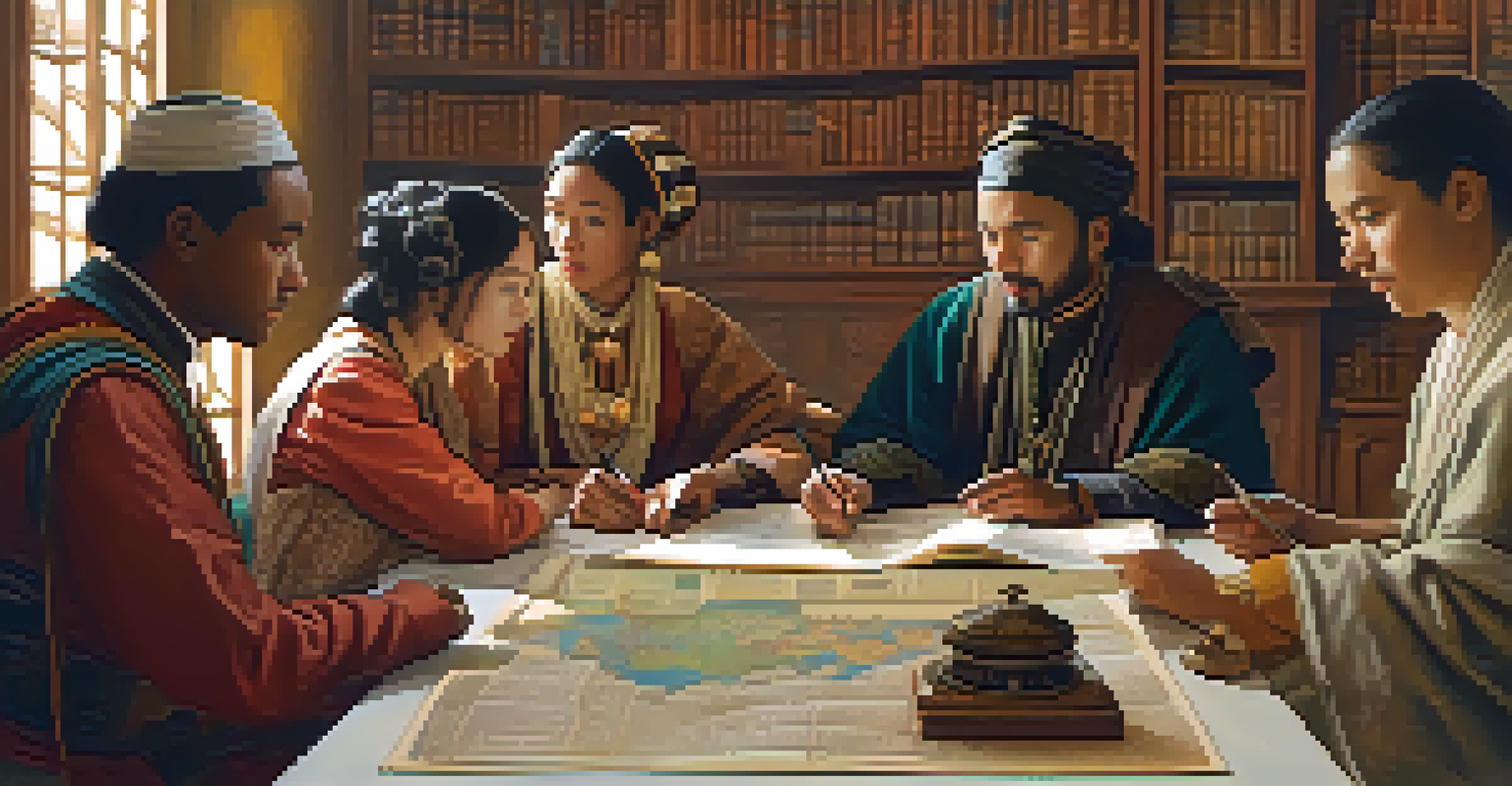The Role of Narratives in Understanding Historical Events

Understanding Narratives: The Stories We Tell
Narratives are the stories we create to make sense of events. They help us connect with the past by providing context and meaning to historical facts. By framing events in a narrative format, we can grasp complex situations more easily, turning abstract dates and figures into relatable tales.
History is not a burden on the memory but an illumination of the soul.
For instance, consider how the story of the American Revolution is often told. Instead of merely listing the battles and dates, the narrative focuses on the struggle for freedom and the voices of key figures like George Washington and Thomas Jefferson. This storytelling approach allows us to engage emotionally, making history feel more personal and relevant.
In essence, narratives transform history from a series of events into a coherent story, helping us understand not just what happened, but why it matters. They encourage us to reflect on our values and beliefs, ultimately shaping our identity.
The Power of Perspective in Historical Narratives
The perspective from which a story is told can drastically alter its interpretation. Historical narratives often reflect the viewpoints of those in power, which can lead to biased accounts. For example, textbooks may emphasize the achievements of certain leaders while downplaying the experiences of marginalized groups.

This bias is evident in the portrayal of colonial histories, where colonizers' accounts often overshadow the voices of indigenous peoples. By examining multiple perspectives, we can gain a more nuanced understanding of historical events. This approach encourages critical thinking and helps us recognize the complexity of history.
Narratives Shape Our Understanding
Narratives transform historical events into relatable stories, helping us grasp their significance and connect emotionally.
When we understand that narratives are shaped by perspective, we become more aware of the need for inclusivity in storytelling. It reminds us to seek out diverse voices and stories that enrich our understanding of the past.
Cultural Narratives: Shaping Collective Memory
Cultural narratives play a vital role in shaping collective memory within societies. These narratives are often passed down through generations, influencing how communities remember and interpret their past. For example, national holidays like Independence Day are steeped in narratives that reinforce a sense of identity and belonging.
Those who cannot remember the past are condemned to repeat it.
These stories can foster unity, but they can also create divisions. Different groups within a society may cling to contrasting narratives about the same event, leading to conflict over historical interpretation. This illustrates how narratives can both connect and separate us, depending on how they are framed.
Understanding cultural narratives is crucial for fostering dialogue and reconciliation. By recognizing the narratives that shape our communities, we can engage in conversations that bridge divides and promote a more inclusive understanding of history.
Historical Revisionism: The Evolution of Narratives
Historical revisionism refers to the reinterpretation of historical events, often in response to new evidence or changing societal values. This process can lead to significant shifts in how we understand the past. For instance, the portrayal of the Civil War in the United States has evolved, as new perspectives have emerged about its causes and consequences.
Revisionism can be both beneficial and controversial. While it allows for a more accurate and inclusive understanding of history, it can also provoke backlash from those who feel their narratives are being challenged. This tension underscores the importance of open dialogue and critical examination of historical narratives.
Perspective Alters Historical Views
The perspective from which a story is told can introduce bias, highlighting the need for inclusivity in historical narratives.
Ultimately, revisionism highlights the dynamic nature of history. As our understanding of the past evolves, so too do the narratives we create, reminding us that history is not static but a living conversation.
The Role of Media in Shaping Historical Narratives
Media plays an influential role in shaping historical narratives in today's digital age. From documentaries to social media, the way history is presented can significantly impact public perception. For instance, films about historical events often dramatize or simplify complex issues to engage audiences, which can lead to misconceptions.
Moreover, the rise of social media has democratized storytelling, allowing diverse voices to share their perspectives on historical events. This shift enables a broader range of narratives to emerge, challenging traditional accounts and enriching our understanding of the past. However, it also raises concerns about misinformation and the spread of biased narratives.
As consumers of media, it's essential to critically evaluate the sources and narratives we encounter. By doing so, we can appreciate the richness of history while being mindful of the influences that shape our understanding.
The Emotional Impact of Historical Narratives
Historical narratives often evoke strong emotions, helping us connect with the past on a deeper level. The stories of struggle, triumph, and resilience resonate with us, making history feel alive and relevant. For example, narratives about the Holocaust serve as powerful reminders of the consequences of hatred and intolerance.
These emotional connections can motivate individuals and communities to advocate for change. When people relate to stories of injustice or heroism, they are often inspired to take action in their own lives. This illustrates how narratives can transcend time, influencing our values and beliefs today.
Media Influences Historical Narratives
In today's digital age, media shapes our understanding of history, requiring critical evaluation to discern accurate narratives.
Understanding the emotional impact of historical narratives allows us to appreciate their significance. It reminds us that history is not just a collection of facts but a tapestry of human experiences that shape our present and future.
Conclusion: The Enduring Significance of Narratives in History
In conclusion, narratives play a crucial role in our understanding of historical events. They help us make sense of complex information, shape our perspectives, and influence our collective memory. By engaging with diverse narratives, we can appreciate the richness of history and recognize the importance of inclusivity.
As we navigate a world filled with competing narratives, it's essential to approach history with a critical and open mind. By doing so, we can foster meaningful conversations that enrich our understanding and promote a more nuanced perspective on the past.

Ultimately, the stories we tell about history matter. They not only inform our understanding of the past but also shape our identity and values as individuals and communities.